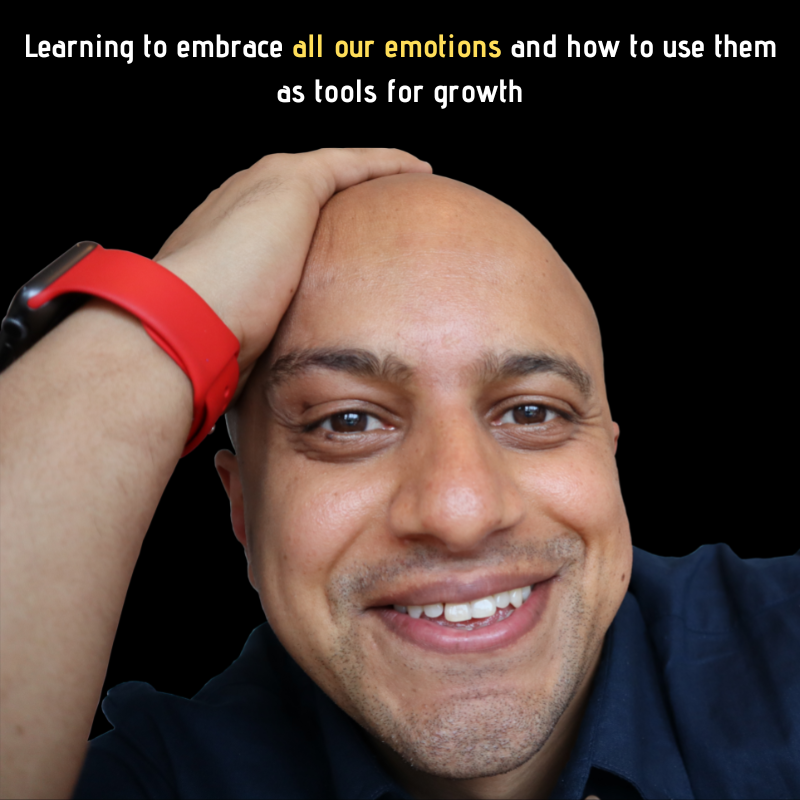This week was rough. This picture was taken on Monday morning when my bike suddenly died and I couldn’t go to work. The builder couldn’t reach my house so I dint have water and as you can see from the picture my toilet was literally in my front yard. I was down, confused and angry. I was a mess.
Learning to embrace all our emotions and how to use them as tools for growth

As the age-old saying goes: ‘It’s all in how you look at it.’ Whether it’s a good or bad experience, it’s how you take it and what you do with it that really matters. We often forget that life isn’t just happy moments – even though they make us feel great – but it’s important to understand that there are other emotions too, such as sadness, loneliness, and shame. All these feelings come from our individual realities (real life) and experiences.
I see this all the time: when times are bad and we feel frustrated, ashamed, or helpless, it can be very hard to open up and accept the truth about our present circumstances. We tend to doubt ourselves and that in return makes us feel worse. But we shouldn’t let self-doubt take over. Everyone and I mean absolutely every single person on planet Earth, has the right to feel pain, whether it’s physical or emotional. And although it is difficult – and I have to admit that sometimes life can be very difficult – we must allow ourselves to go through these tough situations if we are trying to become our best selves.
Accepting our flaws and recognising pain as a part of life
As human beings, we should learn to embrace all our emotions – even those we are not proud of – and use them as tools for growth. We can and should accept our flaws and recognise that pain is a part of life. Acknowledging our feelings can help us to understand why we feel the way we do. Only by understanding our own emotions, we will be able to control them.
We can then exchange the negative and destructive feelings we have for something more meaningful in life. Let’s take pride in the lessons we learn along the way and use those experiences to become stronger and wiser. Let’s focus on enjoying the present moment and the good moments that life brings. I truly believe that by understanding our feelings and taking ownership of our successes and struggles at the same time, we can genuinely become the best version of ourselves.
Setting goals to create a roadmap for our lives
Additionally, one of the most effective ways to use our emotions as tools for growth is by setting goals for ourselves. By setting goals, we create a roadmap for our lives and give ourselves a clear direction to follow. This can help us to focus on what’s truly important in life and avoid getting bogged down by negative emotions.
When setting goals, it’s important and I can’t stress enough how important is to be realistic and specific. We need to be crystal clear about what we want to achieve and set a timeline for ourselves. This will help us to stay focused and motivated (motivated is the name of the game) as we work towards our goals. We should also celebrate our successes along the way, no matter how small they may seem. This will help to build our confidence and keep up the momentum of us moving forward.
The importance of accepting painful emotions
It’s important to recognise that painful emotions are an inevitable part of life. Whilst we may strive for constant happiness and joy, it’s simply not possible to avoid negative feelings altogether. When we suppress or ignore our emotions, we risk experiencing stronger and more prolonged negative emotions in the future.
Accepting and experiencing our painful emotions allows us to better understand ourselves and our needs, and use these emotions as tools for growth. Seeking support from loved ones or professionals can also be helpful in managing and processing our emotions. By accepting and embracing all of our emotions, we can move towards a more fulfilling and authentic life.
Accepting and managing emotions
As humans, we experience a range of emotions, from joy and love to anger and sadness. Unfortunately, society has created an image of perfectionism where only positive emotions are accepted and displayed. This leads to a stigma around the negative emotions that can cause people to suppress them, making it more challenging to manage them when they arise. Accepting all emotions, regardless of their nature, is vital to personal growth.
One of the most critical aspects of emotional acceptance is learning to manage them effectively. Once you understand and accept that emotions are a natural and vital aspect of life, you can learn how to handle them positively. Self-awareness is the key to managing emotions. You must recognise when you are feeling a certain way, understand why you feel that way and acknowledge what caused the emotion.
Using emotions as tools for growth
Rather than suppressing negative emotions, it is essential to use them as tools for growth. Accepting and acknowledging our emotions helps us to work through them effectively, enabling us to grow and develop as individuals. Understanding our emotions can help us identify patterns, recognise triggers and take proactive steps to manage them.
Furthermore, by embracing our emotions, we can gain valuable insights into our thought processes and behaviours, helping us to improve our decision-making and responses to challenging situations. The struggles we face can be our most significant teachers, helping us to develop resilience and coping strategies to navigate difficult situations.
Finding meaning in painful experiences
Painful experiences, such as the loss of a loved one, the breakdown of a relationship or failure in a job, can leave us feeling lost, empty and hopeless. While these experiences are undoubtedly challenging, they can be a source of personal growth and development.
Finding meaning in painful experiences is about understanding that even negative events can have positive outcomes. We can use our pain as a motivator to push ourselves forward, to grow, and to learn from the experience. It is about reframing our pain and seeing it as an opportunity to become stronger and wiser.
Taking ownership of our experiences
Taking ownership of our experiences means accepting both our successes and struggles. Life is full of highs and lows, and it is essential to acknowledge and take responsibility for both. Owning our experiences means not blaming others or external factors for our emotions and experiences. Instead, it means taking responsibility for how we react and respond to good and bad situations in our life.
By taking ownership of our experiences, we truly empower ourselves to create change and take positive action in our lives. It is about recognising our mental power to choose how we respond to situations, rather than allowing ourselves to always be victims of circumstance. Taking ownership of our experiences enables us to be the architects of our lives, creating the path that leads us to where we want to be.
Final thoughts
Life is full of experiences, both positive and negative, and it is vital to embrace them all. Learning to accept and manage our emotions effectively, using them as tools for growth, finding meaning in painful experiences and taking ownership of our experiences are all key components of personal growth and development. By doing so, we can become the best version of ourselves and create a fulfilling and meaningful life.


Leave a Reply